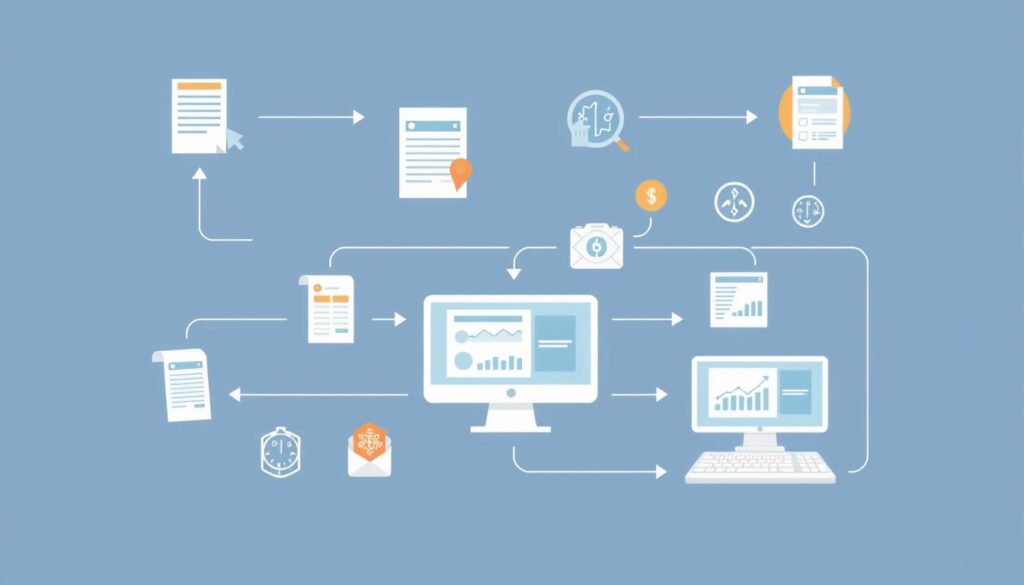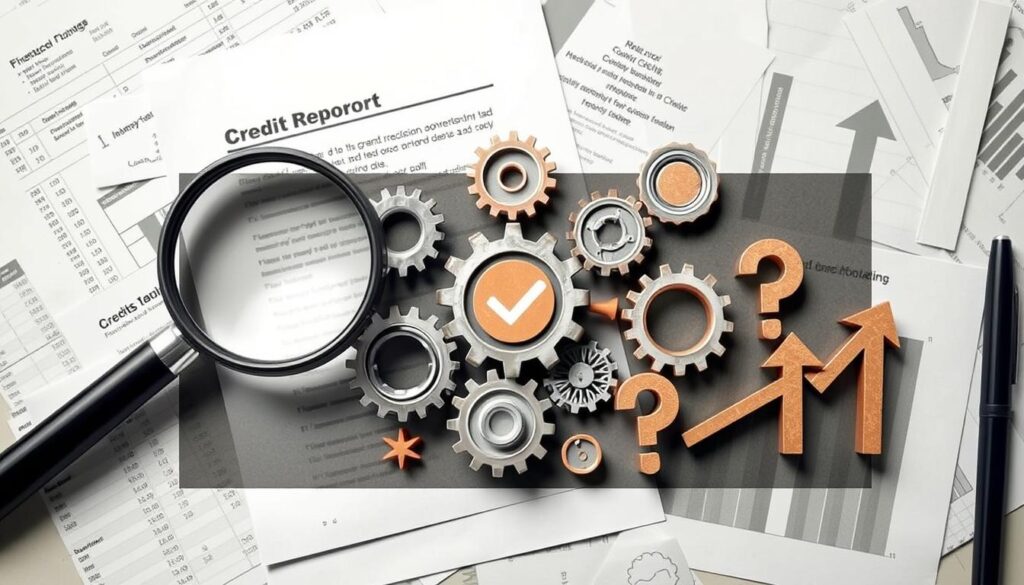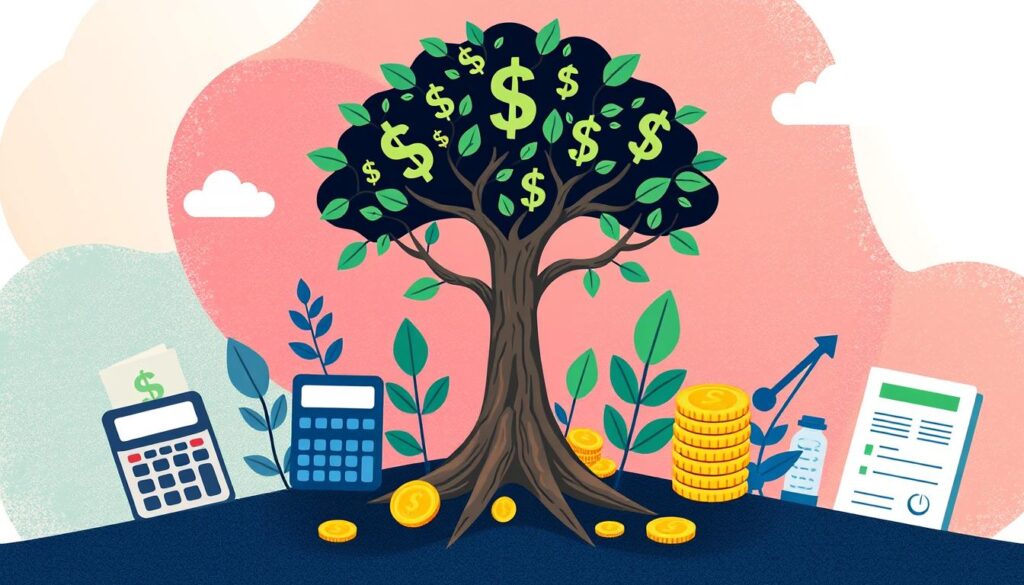Credco, a top credit reporting agency, may have checked your credit for various reasons. This guide explores why and what it means for your finances. We’ll examine the credit check process and help you understand your credit score report.
You’ll learn how to manage your personal credit history effectively. We’ll also discuss credit monitoring services and common reasons for credit inquiries. Knowing your rights for credit report disputes is essential for protecting your financial future.
Key Takeaways
- Credco, a prominent credit reporting agency, may have reviewed your credit for various reasons.
- Understanding the credit check process and your credit score report is crucial for managing your financial well-being.
- Monitoring your personal credit history and addressing any inaccuracies can help protect your credit standing.
- Credit monitoring services and knowledge of credit report laws can empower you to take control of your financial future.
- Navigating the reasons behind credit inquiries, such as employment background checks or loan applications, can provide valuable insights.
What is Credco and Why Did They Check My Credit?
Credco is a major credit reporting agency in the United States. It’s one of three, including Experian and TransUnion. These credit report agencies collect info about our credit history. They use this data to create our credit scores.
Credit scores are crucial in determining our creditworthiness. They include details on payment patterns, credit use, and other financial activities.
Understanding the Role of Credit Reporting Agencies
Credit reporting agencies compile and update our credit reports. These reports show our financial behavior in detail. They include credit types used, payment history, and debt amount.
Lenders and employers often use these reports. They help them make decisions about credit inquiry reasons. These can include approving loans or evaluating job candidates.
Common Reasons for Credit Checks by Third Parties
There are several reasons why credco checked my credit. Common scenarios include:
- Applying for a new credit card or loan
- Renting an apartment or home
- Securing a new job or promotion
- Refinancing an existing mortgage or loan
- Monitoring your credit for potential identity theft or fraud
Knowing about credit reporting agencies helps you manage your finances. It also helps you understand why credit checks happen.
The Credit Check Process: A Step-by-Step Guide
Credit checks reveal how lenders view your financial history. Credco and other agencies follow strict procedures to evaluate your information accurately.
Here’s what happens during a credit check:
- Obtaining Consent: The agency must get your permission first. You’ll usually give this when applying for credit or a background check.
- Reviewing Your Credit File: They’ll look at your credit accounts, payment history, and debts. Public records about your finances are also checked.
- Generating a Credit Report: The agency creates a detailed report of your financial history. They also calculate your credit score.
This process helps lenders and employers make informed decisions about you. Knowing these steps can help you manage your credit better.
| Step | Description |
|---|---|
| Consent Acquisition | The credit reporting agency obtains your written or electronic authorization to access your credit information. |
| Credit File Review | The agency thoroughly examines your comprehensive credit file, including your credit accounts, payment history, and outstanding debts. |
| Credit Report Generation | The agency generates a detailed credit report that summarizes your financial history and calculates your credit score. |

Understanding credit checks helps you keep your information accurate. A strong credit profile can lead to better financial opportunities.
Decoding Your Credit Score Report
Your Credco credit score report offers a glimpse into your financial history. It shows your credit accounts, payment history, and credit inquiries. Understanding this report helps you see what affects your credit score.
The report also includes public records. These details give you a clear picture of your creditworthiness. By reviewing this information, you can spot areas for improvement.
Key Components of a Credit Score Report
The main components of your credit score report include:
- Payment History – Your track record of making timely payments on your credit accounts.
- Credit Utilization – The amount of credit you’re using compared to your total available credit.
- Length of Credit History – The duration of your credit account history.
- Credit Mix – The variety of credit accounts you have, such as credit cards, loans, and mortgages.
- New Credit Inquiries – The number of times you’ve applied for new credit, which can temporarily impact your credit score.
Interpreting Credit Score Ranges
Your credit score falls within a specific range. Knowing these ranges helps you see where you stand financially. It also shows you where you can improve.
| Credit Score Range | Credit Rating |
|---|---|
| 800-850 | Excellent |
| 740-799 | Very Good |
| 670-739 | Good |
| 580-669 | Fair |
| 500-579 | Poor |
Knowing your credit score range is crucial. It helps you build a stronger credit profile. With better credit, you can access more favorable financial opportunities.
Exploring Your Personal Credit History
Your personal credit history records your financial activities. It includes payment patterns, credit use, and account history. Credit agencies analyze this info to calculate your credit score, which lenders use to assess creditworthiness.
Factors That Impact Your Credit Score
Understanding what influences your credit score helps you make smart financial choices. It empowers you to maintain a healthy credit profile. Several key factors affect your personal credit history and credit score.
- Payment history: Your track record of making on-time payments for bills, loans, and credit cards.
- Credit utilization: The amount of available credit you’re using, usually expressed as a percentage.
- Length of credit history: The duration for which you’ve had active credit accounts.
- Types of credit accounts: The diversity of your credit mix, such as credit cards, auto loans, and mortgages.
- Credit inquiries: The number of times your credit report has been accessed, which can indicate recent applications for new credit.
Keep an eye on these factors that impact your credit score. Make smart choices to maintain a healthy personal credit history. This approach will help you reach your financial goals.
“Your credit score is a reflection of your financial responsibility and trustworthiness. Understanding the factors that shape it can empower you to build and maintain a strong credit profile.”
Credit Monitoring Services: Keeping an Eye on Your Credit
Credit monitoring services track your credit profile in today’s digital world. Companies like Credco offer regular updates on your credit report and score. These services help you spot errors or suspicious activity quickly.
They provide features to keep you informed about your credit. You can stay in control of your financial well-being with these tools.
- Regular credit report and score updates
- Alerts for changes to your credit profile, such as new accounts or inquiries
- Identity theft protection and fraud monitoring
- Guidance on improving your credit score and managing your credit history
Using credit monitoring services gives you peace of mind. You can tackle issues fast and keep your finances healthy. It’s a smart way to manage your credit.
| Feature | Benefit |
|---|---|
| Regular credit report and score updates | Helps you stay informed about your credit status and identify any changes or potential issues |
| Alerts for changes to your credit profile | Allows you to quickly address any suspicious activity or errors, protecting your identity and financial well-being |
| Identity theft protection and fraud monitoring | Provides an extra layer of security and helps you mitigate the impact of identity theft or fraud |
| Guidance on improving your credit score | Offers valuable insights and strategies to help you build and maintain a strong credit profile |
Credit monitoring services help you take charge of your financial future. They offer a proactive approach to managing your credit.
“Regularly monitoring your credit is a crucial step in maintaining a healthy financial profile and protecting yourself from identity theft or fraud.”
Credco Checked My Credit: Understanding the Reasons
Wondering why Credco checked your credit? Let’s explore the common reasons. Credco is a major credit reporting agency. They collect credit information for organizations like employers and lenders.
Employment Background Checks
Credco often checks credit for employment background checks. Employers use credit reports to assess financial responsibility. They believe it shows character and decision-making skills.
credco checked my credit is common during hiring. It helps employers evaluate potential candidates thoroughly.
Loan or Credit Card Applications
Credco may check your credit when you apply for loans or credit cards. This includes mortgages, auto loans, and personal loans. Lenders use credit reports to evaluate creditworthiness.
They determine credit terms based on these reports. Credit inquiry reasons often involve loan and credit card applications.
| Reason for Credit Check | Explanation |
|---|---|
| Employment background checks | Employers use credit reports to assess a candidate’s financial responsibility and trustworthiness. |
| Loan or credit card applications | Lenders use credit reports to evaluate a borrower’s creditworthiness and determine loan terms. |
Knowing why Credco checks your credit helps you manage your credit profile better. You can address any errors promptly. Stay informed about credco checked my credit situations.
Understanding credit inquiry reasons allows you to take proactive steps. You can maintain a strong credit history and improve your financial well-being.

Ensuring Accuracy: Disputing Errors on Your Credit Report
Keeping your credit report accurate is vital for a healthy credit profile. Mistakes can hurt your credit and affect dealings with lenders. It’s key to check your report often and fix any errors.
Addressing issues promptly helps maintain your true financial standing. Regular reviews can catch problems early, allowing for quick corrections.
Common Credit Report Mistakes
Some frequent credit report mistakes include:
- Incorrect account information, such as incorrect balances or payment histories
- Erroneous late payments or missed payments
- Accounts that belong to someone else, often due to identity theft
- Outdated or incomplete information about your credit history
Step-by-Step Guide to Filing a Dispute
If you find errors, you can file a credit report dispute. Here’s how:
- Obtain a copy of your credit report from Credco or another credit reporting agency.
- Carefully review the report and identify any inaccuracies or discrepancies.
- Gather supporting documentation, such as payment receipts or account statements, to substantiate your claim.
- Contact the credit reporting agency and submit a formal dispute, providing the necessary information and documentation.
- The agency is required to investigate your dispute and provide you with the results within a specified timeframe.
- If the agency confirms the information is inaccurate, they must correct or remove the item from your credit report.
Fixing credit report mistakes helps keep your credit profile strong. This process safeguards your financial well-being and ensures credit report accuracy.
The Role of Credit Reporting Agencies
Credit reporting agencies like Credco are crucial in the consumer credit ecosystem. They collect, maintain, and distribute credit information about individuals. These agencies gather data from lenders, creditors, and public records to create comprehensive credit reports.
Businesses and lenders use these reports to assess an individual’s creditworthiness. They make decisions about loan approvals, credit limits, and other financial products. Understanding credit reporting agencies is key for consumers to manage their credit effectively.
Key Functions of Credit Reporting Agencies
- Collect and maintain credit information from various sources
- Generate detailed credit reports for consumers and businesses
- Provide credit scores that reflect an individual’s creditworthiness
- Ensure the accuracy and integrity of credit data
- Assist in the credit decision-making process for lenders and creditors
Importance of Credit Reporting Agencies
Credit reporting agencies are the gatekeepers of consumer credit information. Their data determines access to loans, credit cards, mortgages, and other financial products. Accurate, up-to-date credit reports help consumers maintain a healthy credit profile.
| Credit Reporting Agency | Key Services | Market Share |
|---|---|---|
| Experian | Credit reports, credit monitoring, identity theft protection | 26.8% |
| Equifax | Credit reports, credit monitoring, credit scores | 26.1% |
| TransUnion | Credit reports, credit monitoring, fraud detection | 25.3% |
Understanding credit report agencies helps consumers manage their credit and dispute errors. This knowledge is vital for navigating consumer finance and securing favorable loan terms. It also helps in maintaining a strong credit profile.

Credit Report Laws: Protecting Your Rights
Credit reports play a crucial role in financial decisions. Laws protect consumers’ rights in credit reporting. These laws ensure fairness and accuracy in the process.
Fair Credit Reporting Act (FCRA)
The Fair Credit Reporting Act (FCRA) regulates consumer credit information. It ensures credit reporting agencies like Credco maintain accurate reports.
The FCRA gives consumers the right to access their credit information. It also allows them to dispute any errors they find.
Consumer Credit Protection Laws
Other consumer credit protection laws safeguard financial rights and privacy. The Equal Credit Opportunity Act bans lending discrimination.
The Fair Debt Collection Practices Act limits abusive debt collection tactics. These laws work together to protect consumers.
Credit report laws empower consumers by ensuring transparency and fairness. Understanding these rights helps individuals monitor their credit profiles effectively.
Consumers can address discrepancies and protect their financial well-being. Regular credit checks are essential for maintaining financial health.
“Knowledge is power when it comes to protecting your credit. Understanding your rights under the law is the first step to maintaining a healthy financial profile.”
Building and Maintaining a Strong Credit Score
A robust credit score is vital for securing favorable loan and credit card terms. By taking strategic steps, you can achieve and preserve an excellent credit score. This can unlock better financial opportunities and terms for your future.
Consider these key strategies to build and maintain a strong credit score:
- Make timely payments: Consistently pay your bills, loans, and credit card balances on time. This is crucial for maintaining a good credit score.
- Keep credit card balances low: Try to keep your credit card balances well below the card’s limit. High credit utilization can harm your credit score.
- Limit new credit applications: Avoid applying for multiple new credit accounts in a short time. This can result in hard inquiries and temporarily lower your score.
- Diversify your credit mix: Have different types of credit accounts. This shows you can manage various forms of credit responsibly.
Demonstrate responsible financial behavior consistently. Follow these strategies to build an excellent credit score. This can lead to better financial opportunities in the future.
“Maintaining a good credit score is like tending to a garden – it requires patience, diligence, and a commitment to responsible financial habits.”

Navigating Credit Inquiries: Hard vs. Soft Pulls
Credit checks come in two types: hard inquiries and soft inquiries. Hard inquiries happen when lenders review your credit for loan applications. These can briefly affect your credit score.
Soft inquiries occur when you check your own credit or during background checks. These don’t impact your credit score. Understanding these differences helps you manage your credit wisely.
| Hard Inquiry | Soft Inquiry |
|---|---|
| Occurs when a lender or creditor checks your credit as part of a credit application | Happens when you check your own credit or when an employer or landlord reviews your credit |
| Can temporarily impact your credit score | Does not affect your credit score |
| Examples: Applying for a loan, credit card, or mortgage | Examples: Checking your own credit report, employment background check, or rental application |
Knowing about hard vs. soft credit inquiries helps you make smart credit choices. It allows you to protect your credit score and manage your finances better.
Conclusion: Empowering Yourself with Credit Knowledge
Understanding credit checks and their impact is vital for a healthy financial future. Knowing the process, interpreting reports, and being aware of your rights empowers you. This knowledge allows you to control your credit and make informed decisions.
The insights from this article will boost your confidence in managing credit. Remember, understanding credit is key to making smart financial choices. This information will help safeguard your long-term financial well-being.
You now have tools to take charge of your credit health. Stay vigilant about your credit knowledge. Ensure your credit report accurately reflects your financial history.
Take proactive steps to maintain a strong credit profile. This includes understanding why Credco checked my credit. Keep exploring factors that impact your credit score for better financial management.
FAQ
What is Credco and why did they check my credit?
What is the credit check process?
How can I understand my credit score report?
What factors impact my personal credit history?
How can credit monitoring services help me?
Why did Credco check my credit, and what are the common reasons?
What should I do if there are errors on my credit report?
What are the laws that protect my credit rights?
What’s the difference between a hard and soft credit inquiry?
credco credit inquiry, credco inquiry, credco on my credit report, credco on credit report, credco credit reports, how to remove credco from your credit report, credco credit report, credco credit reporting, credco mortgage inquiry, who is credco on my credit report, credco auto loan, credco credit check, credco finance, credco inquiry on credit report, credco management, what credit score does credco use, what is credco on my credit report, who is credco, why is credco on my credit report

